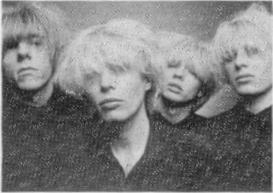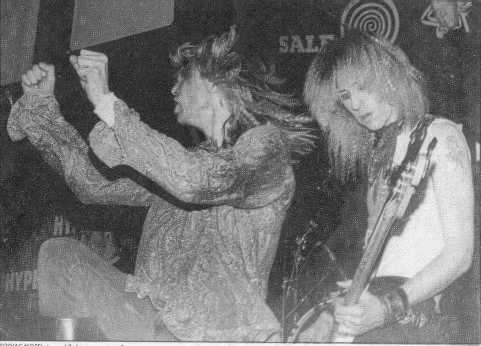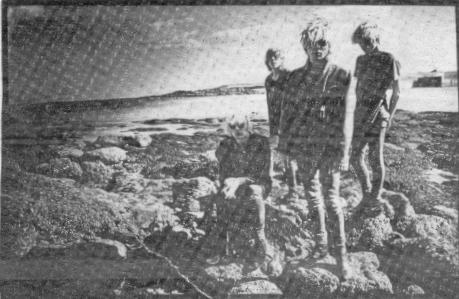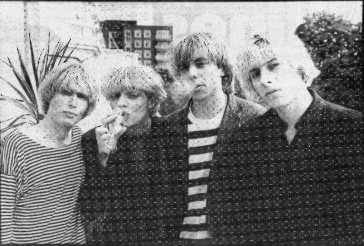|
|
||
|
|
||
|
BIRDLAND |
||
|
Birdland: a white flash on the music scene. In the history of pop, it is unlikely they will even garner a footnote. But for this music fan, they served as a timely reminder of the thrill of rock 'n' roll - played fast. They tried to grow up too fast and got lost in the tide of American grunge and Britpop. All they left were a handful of singles, a mediocre album and a shed load of classic gig memories. Before
Birdland, there was Zodiac Motel. It's probably fair to lump Zodiac
Motel in with the post-grebo, neo-pyschedelia, goth/hippy stuff: Crazyhead,
Ghost Dance, Gene Loves Jezebel. With a dash of Bunnymen. The core
of the band were two brothers, Robert and Lee Vincent from Tamworth,
near Birmingham, in the industrial English midlands. Released sometime
in 1986, Zodiac Motel's debut album is an endearing collection of
teenage psychedelic pop that give the barest hint of the eventual
Birdland format. The brothers were aided and abbetted on this release
by Ian Julian (bass) and Andy Lane (guitar solos). Two more 12"
EPs were to follow: 'Sunshine Miner' and 'Crystal Injection' - both
more sophisticated releases than the album and featuring songs that
would go on to form part of the Birdland repetoire. Zodiac Motel left a greater legacy than their profile perhaps merited. Despite their success in terms of getting records out, little in the way of press attention seemed forthcoming. A live review in national weekly Sounds in March 1988 was a rare case of publicity: "Possibly too cuddly for mega-success, Zodiac Motel should nevertheless be viewed post-bloody-haste."
What's perhaps most interesting about Zodiac Motel is the speed at which transformed themselves into an entirely new entity - Birdland - by the summer of 1988. Robert and Lee are joined by Simon (Syd) Rodgers and Neil Hughes (variously referred to as Kale or Kyle in the press) on bass and drums respectively. Gone are the psychedelic gladrags, replaced by uniform of black and bleached hair. Birdland looked like a band. A London-based management company, Ronald Morris Associates (the home of Lazy Records), were soon interested and began paying some of the band's expenses by the July. In August the band recorded a two track demo, engineered and produced by Primitives soundman Paul Sampson. A handful of shows in London - which include a two song set at the neo-psych Alice In Wonderland Club in Soho - and another demo during the latter months of the year are enough to interest the press. Lazy secure the band a support slot on a nationwide tour with Jane's Addiction in January but they are dismissed after alleged mayhem following the first date in Manchester. Although the resultant column inches (both Sounds and Melody Maker are in attendance) are enough to bring about some much needed profile, already the band are hostage to a press corp intent on depicting them as cartoon punks or teenage tearaways. It was a tag they would increasingly come to resent. A debut EP for Lazy, 'Hollow Heart' is an adrenaline rush through the heart of Madchester and becomes an immediate classic. Swathed in Jesus & Mary Chain feedback, the decision to segue the first three tracks into a medley, replicating the rush of the live show was one of the great decisions in rock'n'roll. If Birdland had never made another record, this would be enough to justify their place in the annals of history. Panned by the judges on TV panel show 'Jukebox Jury', the audience vote it a hit and it climbs the independent charts, knocking the Pixies' 'Monkey Gone To Heaven' from the number one position. Sounds were moved enough to suggest that: "...as
far as debut discs go, this ranks among the all-time greats. Notice
how I've refrained An excellent promo video, a jump-cut melange of Warholian primary colours secures a considerable amount of airplay on national TV. Their first national tour in support of the single took them around the bottom rung of the British club circuit. Future Radio 1 DJ Steve Lamacq followed the band for the NME to Newcastle and Edinburgh, where a spot of post-gig van surfing is halted by some of Her Majesty's finest. The threat of further proceedings are dropped in exchange for some t-shirts: one of the coppers recognise the band from ITV's 'The Chart Show'.
The
band's emerging public profile co-incided with a flourishing of the
British music press - in particular Melody Maker, the paper
most supportive to the Birdland cause. Writers like Chris Roberts,
Simon Reynolds, Everett True, Bob Stanley and Paul Lester made Wednesdays
the most exciting day of the week. Inspired by the boundary-pushing
bands of the time, Melody Maker sought to provide the words to complement
the music being made - although sometimes the writing soared far above
the worth of the music it was often only nominally concerned with.
It was Roberts who coined the idea of 'blonde', a tongue-in-cheek
response to the emergence of a few bands like The Primitives, The
Darling Buds and even Transvision Vamp. Birdland's intimate relationship
with the peroxide bottle meant they got lumped in, probably much to
their chagrin, but in many ways they exemplified the notion of faded
glamour and CBGBs c. 1975.
More shows follow through May to July where the band cement their reputation as one of the country's most exciting live draws. A session for John Peel's Radio 1 show was broadcast in June. They perform both sides of their second single alongside 'Sugar Blood' and a cover of Television's 'See No Evil' - the only studio recording of the track so far surfaced. The release of 'Paradise' is unenthusiastically received by the Melody Maker ("When Birdland get round to writing a decent song, they might make a third-rate Buzzcocks, but don't call me. The next person who tells me I should see them live gets it in the ear.") but it hits the top of the independent charts in a top five that includes Pixies, James, Stone Roses and De La Soul. In reality it was an excellent follow up, showcasing the band's ability to create spiky blasts of three-minute New Wave. The flip side, 'White' is perhaps the most violent song in the band's catalogue whilst 'Rage' successfully marries acoustic verses with a typical thrashy chorus.
In terms of marketing, Lazy understood the collector's instinct and many of their releases were typified by limited runs or special editions. For Birdland, the label created one of the industry's most generous offers by giving away 10,000 copies of a one-sided live album on the band's October tour. Recorded the previous month at Bath Mole's Club, the album was a document of the band at their peak. Robert explained to Melody Maker the rationale behind the move: "It's just Birdland being nice, giving something back to the people who've been coming to see us this year. ... Plus they'll be getting a recorded souvenir of all our best older stuff. It's a really brilliant LP, a classic live album like 'Metallic KO' or 'Max's Kansas City." He also mentions that the band will be playing new material on the forthcoming tour, including an unknown title, 'Follow Your Heart'. A third single, 'Sleep With Me' is issued on 22 January 1990, supported by yet another round of tour dates which are typified by a stream of damaged equipment - both the band's and that belonging to various venues along the way. At the Brighton Richmond on 10 January, damage to the PA, a broken guitar and bass amp more than wipe out their two hundred pound fee. On 13 January, the band lose another one hundred and fifty pounds and drummer Kyle receives a broken nose from a disgruntled doorman at the Oxford Jericho Tavern. The next evening's show in Milton Keynes is cancelled. 'Sleep With Me' was built around a cute r'n'b riff, a great example of taking a trad element but making it sound contemporary. Lyrically, the song might be corny but it still sounds great today and the production especially hasn't dated at all. The b-side, 'Wanted', was one of those songs that you were certain you'd heard before but could never place. All you knew was that it was a fantastic song. Unfortunately, the 7" EP exhibited the first signs of the band's 'serious' streak: pointless acoustic versions of songs that didn't particularly fit the format. This desire to shake the supposed cartoon media image would continue to haunt the band. Of the other bonus tracks, 'All Over Me' used the same chord changes as every other Birdland song but had some nice acoustic overdubs. 'Stay', one of the band's earliest songs was a more satisfying version than had appeared on the 'Paradise' mispress. During March, the band decamp to a studio in Coventry with Paul Sampson to attempt their debut album. They record thirteen tracks, including re-runs through 'Paradise', 'White' and 'Gotta Gettaway' alongside new material. The tracks show a band looking to expand upon their existing blueprint with surprising results. 'Shoot You Down', despite being almost a parody of the Birdland sound and song structure is enhanced by the use of 'I Wanna Be Your Dog'-style piano which successfully transforms the song into a driving rock'n'roll track. Many of the other songs [see here] would be re-recorded over future projects with few differences, but three songs remain otherwise unreleased. Of these, 'Hassles' is by far the weakest, boasting corny lyrics and a particularly poor chorus. However, both 'Johnny Got Rich' and 'Love Is A Fever' are respectable stabs at slightly more mature material, with 'Johnny...' in particular sounding like a young Tom Petty, complete with dubious 'outlaw' lyrics (Just how many local "drugstores" did Birdland have access to in the early 1990s?) Plans to release 'Shoot You Down' as a single are postponed and the album shelved. This set-back is perhaps the crucial turning point for the band. It would be almost another year before their album would finally hit the shops, although the management opinion at the time appears to have been that it was too early in their career for an album. With their popularity at its greatest, Birdland - or their management - arguably threw away the best opportunity to build upon their initial success. By 1991, and a mediocre debut, the world had stopped listening. Despite this disappointment, other developments were more promising. The band sign a deal with Toshiba EMI for the Japanese market during July. Japan will go on to issue some of the most interesting items from the Birdland catalogue. In the USA, Morris persuades RCA to sign the band and, in an echo of the Sex Pistols' A&M debacle, the American arm of MCA buy the band out of their RCA contract almost immediately, without the band having ever issued anything on the latter.
|
||






